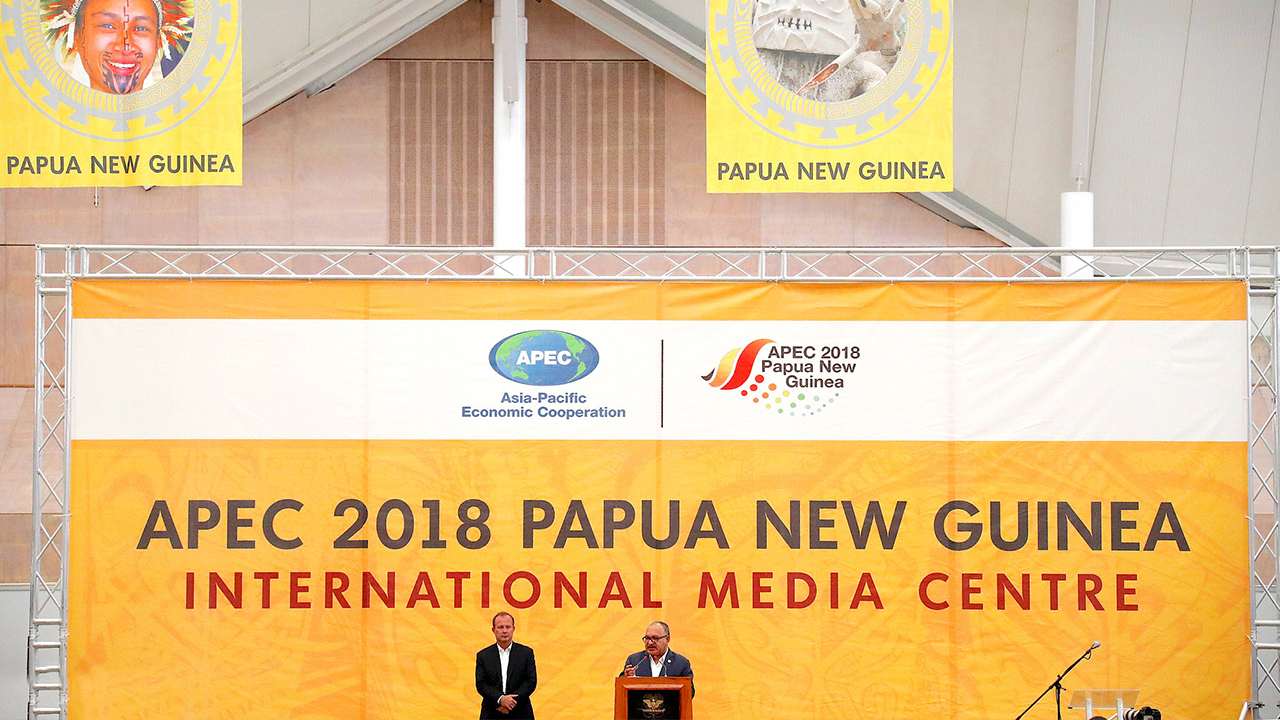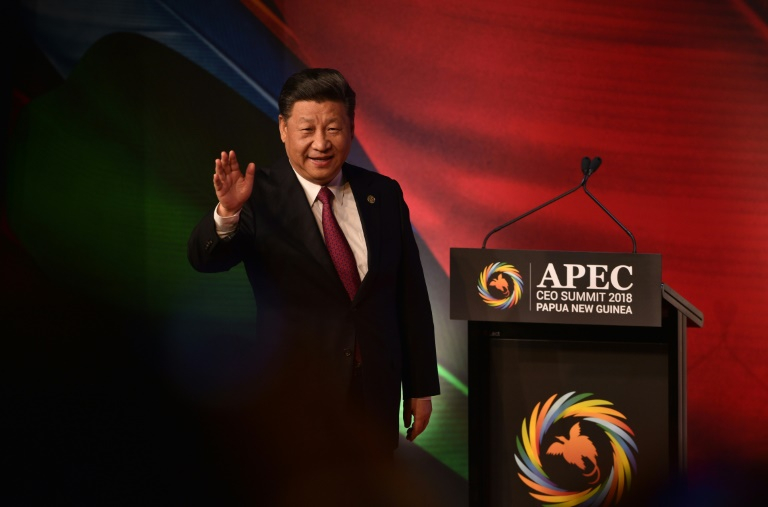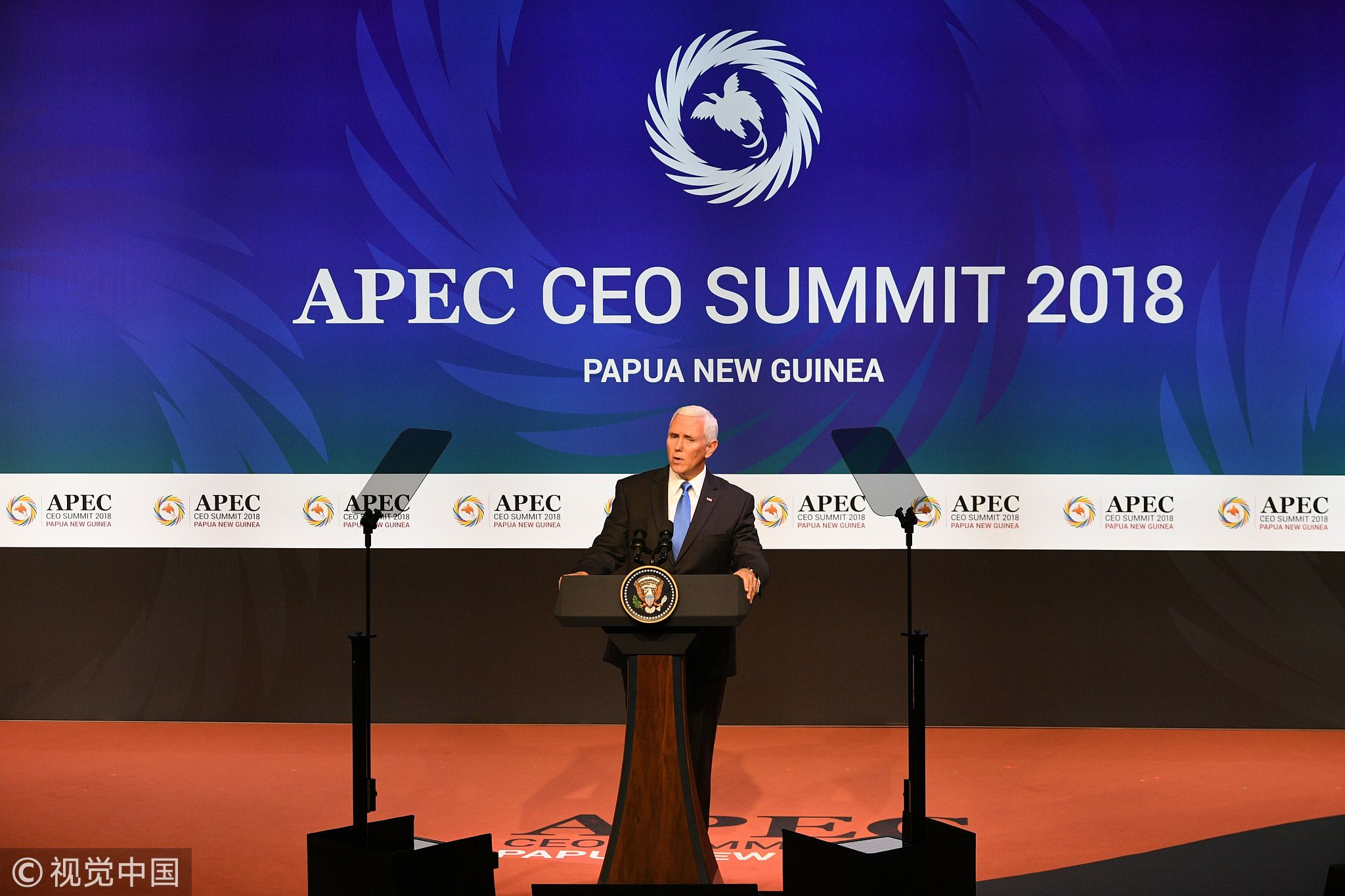
Opinions
20:27, 18-Nov-2018
Opinion: APEC's future depends on inclusive and win-win cooperation
Updated
20:14, 21-Nov-2018
Dr. Summer

Editor's note: With a doctoral degree in communications from the Communication University of China, Dr. Summer has been working in the field of international journalism for 30 years. The article reflects the author's opinion, and not necessarily the views of CGTN.
During the APEC meetings held in Papua New Guinea, we heard two opinions in the speeches given respectively by US Vice President Mike Pence and Chinese President Xi Jinping this weekend.
Although this year's leaders' meeting is under the theme of “Harnessing Inclusive Opportunities, Embracing the Digital Future”, the solutions on the region's development and future offered by China and the US differed on several key issues.
US seeds discord while China calls for partnership
Firstly, the US tries to seed discord and fear while China calls for a closer partnership to jointly meet common challenges. Although Pence acknowledges that “sovereign and independent nations, with diverse cultures and many different dreams, [could] prosper side-by-side, and thrive in freedom and peace”, he purposely divides countries in the region into different categories, such as “most cherished treaty alliances”, “allies and partners”, and “grave threats to security”.
Pence even states that, “While our ongoing investment in prosperity across this region has been immense, the United States has also continued to stand with like-minded nations to ensure security and peace across the Indo-Pacific.”

US Vice President Mike Pence speaks during a bilateral meeting on the sidelines of the APEC meeting, November 17, 2018 ./VCG Photo
US Vice President Mike Pence speaks during a bilateral meeting on the sidelines of the APEC meeting, November 17, 2018 ./VCG Photo
According to Pence, this year, the US has “provided more foreign military financing to the Indo-Pacific than the previous three years combined”.
The US Vice President even asserts blatantly that “We will continue to fly and sail wherever international law allows and our national interests demand; harassment will only strengthen our resolve. We will not change course.”
But it's alerting that in his statement, the US national interests are listed side by side with international law.
For his part, Chinese President Xi Jinping stresses the need to “forge a closer partnership and jointly meet common challenges”. He says that over the past three decades, APEC “has fostered a partnership featuring mutual trust, inclusiveness and win-win cooperation”.
While recognizing the fact that “Asia-Pacific countries vary in national conditions, differences among us are normal," the Chinese leader stresses that it is important “to stay committed to the shared goal of common development, address differences through consultation and explore solutions to common challenges in the spirit of partnership.”

Chinese President Xi Jinping at the APEC meeting, November 17, 2018 ./AFP Photo
Chinese President Xi Jinping at the APEC meeting, November 17, 2018 ./AFP Photo
"Only through engagement in both healthy competition and mutually beneficial cooperation can we jointly build a community with a shared future in the Asia-Pacific," President Xi says.
"America First" vs. China's win-win cooperation
Secondly, the US stresses “America First” while China calls for win-win cooperation.
In his speech, Pence reiterates that “in the days ahead, the United States will continue to put America first”, which means that the White House will not only do so in terms of concrete benefits, such as economic and trade deals, but also in defining the rules and principles.
According to the US vice president, the rules are that any deal is viewed unfair unless “the United States remains in a strong position” and those trade relationships should be forged “in the principles of fairness and reciprocity”.
That's how the US has “forged new and historic trade deals” with Mexico and Canada. And the United States will “make bilateral trade agreements with any Indo-Pacific nation that wants to be our partner and that will abide by the principles of fair and reciprocal trade.”

US Vice President Mike Pence delivers his keynote speech at the APEC CEO Summit in Port Moresby, Papua New Guinea, November 17, 2018 ./VCG Photo
US Vice President Mike Pence delivers his keynote speech at the APEC CEO Summit in Port Moresby, Papua New Guinea, November 17, 2018 ./VCG Photo
Under this logic, only when the actions have led to growth in the US can other countries all across the Indo-Pacific get the benefit as well.
In his speech, Chinese President Xi Jinping calls for an open economy in the Asia-Pacific. He says, “an open, inclusive and transparent approach to the various kinds of free trade arrangements” is needed to ensure coordinated and positive interactions so as to make the development “beneficial for all.”
The Chinese President cites the first China International Import Expo (CIIE) as testimony to China's strong commitment to support free and open trade and to voluntarily open its market to the world.
The CIIE was attended by 172 countries, regions and international organizations, and 3,600-plus companies and over 400,000 Chinese and foreign buyers who sealed the deals that worth 57.8 billion US dollars.

The first China International Import Expo (CIIE) was held in Shanghai, China, November 9, 2018. /VCG Photo
The first China International Import Expo (CIIE) was held in Shanghai, China, November 9, 2018. /VCG Photo
The Chinese leader also shares China's experience in developing the digital economy. He says while new technologies and new business models have brought profound changes to the lives of the Chinese people, “China seeks deeper cooperation on digital economy with other members of the Asia-Pacific so as to expand convergence of interests and create more growth areas, thus adding strong and fresh impetus to the Asia-Pacific economy.”
He welcomes other countries in the Asia-Pacific region “to get aboard the fast train of a growing digital economy”.
President Xi promises that “China will stay deeply engaged in the Asia-Pacific cooperation process, increase its input, deepen practical cooperation with other parties involved, and make a new contribution to the development and prosperity of the Asia-Pacific region.”
(If you want to contribute and have specific expertise, contact us at opinions@cgtn.com)

SITEMAP
Copyright © 2018 CGTN. Beijing ICP prepared NO.16065310-3
Copyright © 2018 CGTN. Beijing ICP prepared NO.16065310-3